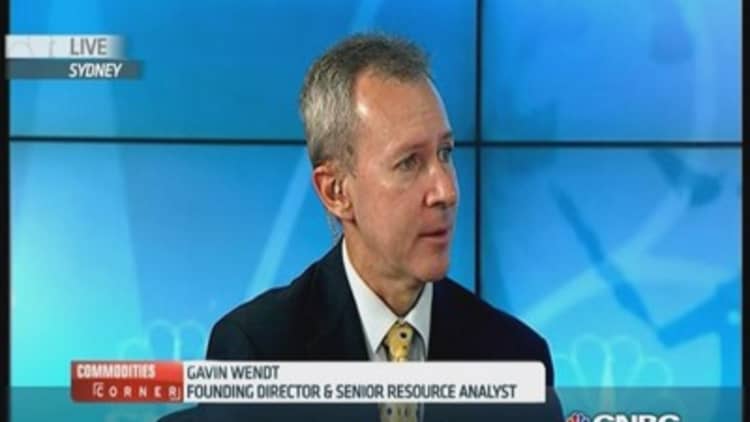Times are tough for Australia's junior minors as plunging iron ore prices squeeze them out of the market, but analysts believe oil's recent decline will provide respite.
"The one thing that has helped smaller miners is the fall in oil prices and the Australian dollar," Gavin Wendt, founding director and senior resource analyst at MineLife, told CNBC on Tuesday. "That should provide them with insulation to iron ore prices."
Prices of the ferrous metal are once again in sight of five-year lows at $67 per ton after falling below those levels last year amid a massive supply glut and waning Chinese demand. As major miners like Rio Tinto and BHP Billiton continue to expand production, smaller miners are being forced to slash costs and consolidate to survive due to small economies of scale as well as high costs and breakeven prices.
On Tuesday, shares of Atlas Iron dropped as much as 7 percent after the firm revised down guidance on capital expenditure this financial year by A$25 million. Other miners resorted to more severe measures: Deloitte estimates that nearly 200 Australian mining companies filed for bankruptcy between June 2013 and September 2014.
Read MoreIron ore glut: Are shutdowns the only way out?
"An iron ore price of $70 per ton still provides plenty of upside for BHP and Rio, which have break-even costs below $50 per ton," Wendt said. But it puts a host of junior producers underwater given their higher break-even prices, he said. Wendt estimates break-even prices for Gindalbie Metals at $98, Grange Resources at $86, Atlas Iron at $82 and Mount Gibson at $77.
Oil respite
Now, cheaper oil prices are changing the outlook for smaller players, MineLife said.
The more than 50 percent tumble in Nymex and Brent oil prices over the past six months has flowed through to diesel, which is a major cost component for the mining industry. Australian diesel fuel prices recently hit six-year lows, and those cost savings take the pressure off junior miners to lower production or end operations, Wendt said.

"The mining process actually consumes almost no crude oil directly. Rather, diesel is the overwhelming fuel used in mining and thus diesel prices rather than crude oil prices matter for mining costs," said Citigroup in a report last week.
Citigroup highlighted another benefit of cheaper oil: cheaper shipping.
Read MoreWhy iron ore's meltdown is far from over
The cost of shipping iron ore from Australia to China – the world's largest iron ore consumer – has dropped by 36 percent as oil's tumble lowers the cost of fueling ships, Citigroup said. Australia is one of the largest iron ore exporting nations, and Beijing is one of its top customers.
"More distant producers and consumers to benefit the most as freight represents a greater share of total costs for such transactions, creating greater savings as costs have fallen. For example, iron ore freight rates from Brazil have declined $10 per ton since July, while those from Australia have declined $3 per ton," the bank said.
A weaker Australian dollar is another bright spot for junior iron ore miners as it makes domestic exports more competitive overseas, Wendt said. The currency came close to falling below 80 U.S. cents last week, hitting its lowest level since July 2009.
The effects of lower oil and the falling domestic currency saw operating margins improve by A$16 per ton for Atlas Iron and A$11 per ton for BC Iron last quarter, Reuters recently reported, citing RBC Capital, which makes up for iron ore's decline of A$8-10 per ton during the same period.
In turn, MineLife expects the cost of production to be reduced to $65-70 a ton for junior miners, compared with $85 previously.

